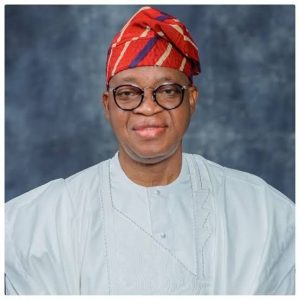

If there was any iota of doubt that the 2007 Act which gave birth to the Council For the Regulation of Freight Forwarding in Nigeria, CRFFN, ought to have been abrogated last week’s judgement by Justice D.E. Osiagor was the final nail on its coffin. The controversial CRFFN Act, No16 was enacted on April 30, 2007.Under the Act,the Council was charged with the responsibility, amongst others, to regulate and control the practice of Freight Forwarders in Nigeria, promote the highest professional standards and competence among members . The passage of the bill and eventual signing into law was however greeted with mixed feelings.
The propriety or other wise of the Council came mostly from the key associations in the sector viz; the Association of Nigerian Licensed Customs Agents, ANLCA, the National Council of Managing Directors of Licensed Customs Agents, NCMDLC and the National Association of Government Approved Freight Forwarders, NAGAFF, among others.While associations like NAGGAF hailed the its creation, the discordant tunes from ANLCA and NCMDLC were mixed depending on who you were speaking with. Those who opposed its creation said it was likely to create another layer of beaucracy at the ports, its emergence ran contrary to the spirit and letter of the Oransanya report which made a case for the merger or collapse of agencies under the Federal Ministry of Transportation, now Marine and Blue Economy Ministry. Issues ranging from the composition of the 15 man board and the proposed collection of the controversial Practioners Operating Fees, POF, almost tore the Council apart. Mr Mike Jukwe who emerged as pioneer Executive Secretary of the Council, spent a better part of his tenure trying to reconcile the warring parties.

Feeling frustrated over the irreconcilable difference, National President of the National Council of Managing Directors of Licensed Customs Agents, Lucky Emiwero,acting on behalf of himself and the Trustees of the National Council of Managing Directors of Licensed Customs Agents ,in 2008, headed to a Federal High Court in Ikoyi seeking for the following reliefs;
- a declaration that the business of Licensed Customs is not under the control and regulation of the Ministry of Transportation and Council for the Regulation of Freight Forwarders CRFFN;
- that Licensed Customs Agents and the business of Licensed Customs Agents ,and the right of Licensed Customs Agents to enter the Port to conduct and carry out business of Licensed Customs Agents is created and regulated by the Customs and Excise Management Act ;
- a declaration that Licensed Customs Agents and the business of Licensed Agents and Freight Forwarders are functionaly and operationally different bodies under the control and regulation of different bodies and business under the regulation and supervision of different and separate government ministries and parastatal;
- a declaration that the ministerial directive mandating that the Council or the Regulation of Freight Forwarders in Nigeria to commence collective of Practioners Operating Fees (POF) and payment of Practioners Operating Fees(POF) is a requirement for release and delivery of cargo from the sea ports ,land borders and Airport is ultra vires of the Minister of Transportation, and therefore null and void;
- a declaration that all applications for renewal of licences by Customs Licensed Agents must first be cleared by the Council For Regulation of Freight Forwarders in Nigeria as null and void:
- a declaration that the ministerial directive mandating that Security gate passes for access to seaports and international airports must be issued by CRFFN is ultra vires;
- a declaration that Licensed Customs Agents be allowed access to the seaport, cargo airport to carry out legitimate business upon preservation of valid licence registered as a Customs Licensed Customs.
The Defendants in the suit were the Attorney General of the Federation, the Hon Minister of Transportation,,the Nigerian Ports Authority and Council for Regulating Freight Forwarding in Nigeria. Delivering judgement in the 17 years old suit on Monday, June 26 in Lagos, Justice D. E. Osiagor of the Federal High Court, Ikoyi ,in granting all the reliefs sought by Amiwero on behalf of the Trustees of the National Council of Managing Directors of Licensed Customs Agents, said” the business and regulation of Licensed Agents fall exclusively under the Customs and Excise Management Act, cap C45 LFN 2004, which vests regulatory control in the Minister of Finance and the Nigeria Customs Service. The Council for the Regulation of Freight Forwarding in Nigeria, established under the CRFFN Act 2007,is a separate regulatory body whose jurisdiction applies only to Freight Forwarders, not licenced Customs Agents. That the Hon Minister of Transportation lacks legal authority to issue directives regulating the business or operations of Licensed Customs Agents. And that the said directive imposes unlawful and conflicting regulatory obligations on Licensed Customs Agents causing uncertainty, hardship and jeopardy to their operations. As the Council For Regulation of Freight Forwarders in Nigeria prepares to appeal the judgement, Mr Amiwero who described the verdict as a landmark judgment, is confident that no appeal will upturn the judgment of the lower court .He explained that CEMA is very explicit on who regulates the operations of Licensed Customs Agents. Said Amiwero: ” Our next battle is how to recover every kobo illegally collected from our members.
We also going to enforce judgment by ensuring that no more collection of Practioners Operating Fees is collected henceforth. It is estimated that at least N5b may have been collected since POF was introduced a couple of years ago even as modalities for the sharing of proceeds remain unresolved. As it stands, the fate of CRFFN hangs in the balance. Some maritime lawyers who spoke on condition of anonymity explained that only an ammendment of CEMA and CRFFN Act can resolve the impasse as the law is very clear on who controls and regulates the operations of Licensed Customs Agents.

